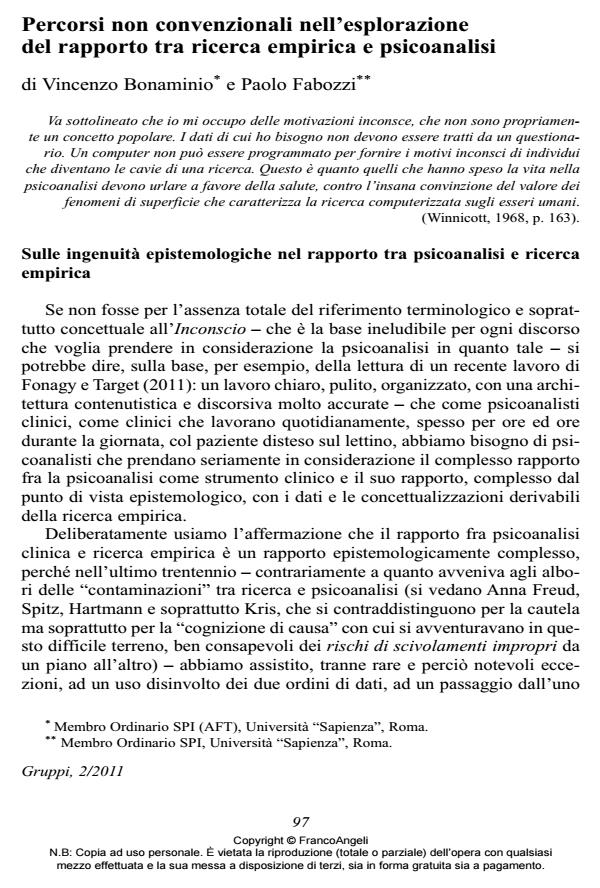Percorsi non convenzionali nell’esplorazione del rapporto tra ricerca empirica e psicoanalisi
Titolo Rivista GRUPPI
Autori/Curatori Vincenzo Bonaminio, Paolo Fabozzi
Anno di pubblicazione 2012 Fascicolo 2011/2 Lingua Italiano
Numero pagine 28 P. 97-124 Dimensione file 379 KB
DOI 10.3280/GRU2011-002007
Il DOI è il codice a barre della proprietà intellettuale: per saperne di più
clicca qui
Qui sotto puoi vedere in anteprima la prima pagina di questo articolo.
Se questo articolo ti interessa, lo puoi acquistare (e scaricare in formato pdf) seguendo le facili indicazioni per acquistare il download credit. Acquista Download Credits per scaricare questo Articolo in formato PDF

FrancoAngeli è membro della Publishers International Linking Association, Inc (PILA)associazione indipendente e non profit per facilitare (attraverso i servizi tecnologici implementati da CrossRef.org) l’accesso degli studiosi ai contenuti digitali nelle pubblicazioni professionali e scientifiche
Gli autori sottolineano il fatto che negli ultimi tre decenni si è assistito molto spesso ad un passaggio dalla metodologia di ricerca empirica a quella psicoanalitica senza alcuna consapevolezza di quelle che in filosofia della scienza si chiamano «regole di corrispondenza regole che disciplinano le eventuali ibridazioni fra due diversi ambiti scientifici. Essi auspicano un confronto nei termini di una reciproca fertilizzazione che non stravolga, in nome di una supposta rifondazione su "inequivocabili" dati empirici, il nucleo essenziale della psicoanalisi, cioè l’esistenza dell’inconscio. Tale rischio si palesa soprattutto con il bambino competente costruito dall’infant research, un bambino fondamentalmente privo di inconscio. Il rischio è che l’oggetto e la metodologia delle ricerche empiriche deformino la psicoanalisi, che sembra allora doversi occupare non più di quanto viene difensivamente escluso, rimosso o scisso dalla coscienza, ma piuttosto di una varietà di procedure mentali implicite organizzate automaticamente: in questo caso la trasparenza soggettiva sostituirebbe ingiustificatamente l’individuazione delle determinanti inconsce. Rinnovare l’inscindibilità dell’intreccio freudiano tra teoria, metodo e cura costituisce quindi la possibile strada da percorrere e da esplorare per rendere euristica una definizione di specificità della psicoanalisi.;
Keywords:Psicoanalisi, infant research, verifica empirica, irrilevanza dei dati sperimentali, metodo clinico, metodo osservativo.
- Come validare le interpretazioni e le spiegazioni in clinica senza ricorrere alla ricerca empirica Mauro Fornaro, in PSICOTERAPIA E SCIENZE UMANE 4/2013 pp.601
DOI: 10.3280/PU2013-004002
Vincenzo Bonaminio, Paolo Fabozzi, Percorsi non convenzionali nell’esplorazione del rapporto tra ricerca empirica e psicoanalisi in "GRUPPI" 2/2011, pp 97-124, DOI: 10.3280/GRU2011-002007